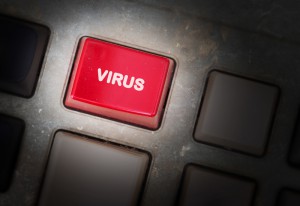
You can have any machine — from the latest and greatest, to the old dinosaur in the corner — but if you don’t have virus protection, your latest and greatest machine might soon run like that dinosaur in the corner.
All of your sensitive images, documents, billing information, and passwords are subject to infection. No matter how careful you are, there is always something that slips through the cracks.
Often, users say, “I have such and such subscription,” or “I don’t click on anything I don’t know,” but the people spending countless hours causing havoc on computer users will always find new and sneaky ways to infect computers.
Viruses can be attached to images or links on websites. They can also be renamed to look like something that you should install. Once inside your computer, they are hard to track down even by a seasoned computer technician.
Viruses very rarely remove anything from your computer. Instead, they have a tendency to add things that can record your activities on your computer. A person could install a silent program that will start recording your keystrokes triggered by keywords; it can also take a screenshot or record email addresses and passwords. Most of the time, they don’t need to even gain access back to your computer to report the data.
They can have an email sent from your computer and Internet connection without you knowing it. That email, secretly sent from you to them, would contain your information (keystrokes, clicks, etc.).
By now, you have heard of the “crypto virus” and all of its variants. There are many solutions out there, but select few offer “zero-hour” infection reversal, however it’s something that businesses can especially benefit from. Let’s say you accidentally encrypt your machine; it would then be inaccessible until you pay the ransom to unlock your files.
Protection that offers infection reversal can revert your system back to its state right before you were infected and it would be like you never infected by the virus at all. This feature is part of Webroot Secure Anywhere, which is something we can provide.
Viruses not only help people steal your data, but they can also delete or corrupt files, degrade system performance, and make your computer run slower.
Viruses can also prevent programs from working and they can use your email to send out copies of itself to your contacts and other users. Sometimes, they can disable your computer from starting up by corrupting your BIOS firmware.
A couple of the main things that you’ll notice once you’re infected is that your system could run slower and you’ll receive all kinds of fake pop-ups, ads, warnings from “Microsoft,” etc. These type of files are referred to as “scareware” and the makers feed on the fear that you might lose your data, so you’ll pay them to “unlock” your system or “remove” the virus.
Again, we go back to protection. If you had virus protection, then it’s likely that would stop it before it even established itself inside your computer.
There are a few things you should do, if you haven’t already: get some sort of whole computer protection (such as Webroot), have restore points saved on your operating system, have a backup of your operating system install saved on some sort of external media, and save your documents, pictures, and videos to an external source.
When you find yourself in a predicament where you have to wipe an entire computer to remove an infection, you’ll be glad you took the time to prepare for the worst.


